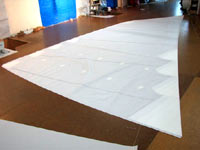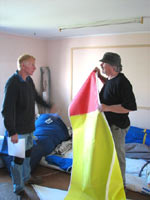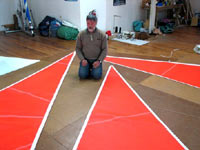|
23 July, '06

The mainsail
with its unbattened hollow leach all spread out. Note
that this sail has 3 rows of reefing, the storm staysail
takes over when it gets beyond this, the boom and gaff
can be then strapped down to the gallows and with the
small jib the trysail gives enough drive to control the
boat in really heavy weather. |

Sailmaker
Tony Thornburrow ( left) and builder Charlie Whipple under
his famous hat talking over colour and cut for the gaff
topsail. This sail, although small is set right up high
and will make a real contribution to the boats light weather
performance. |
This week has been continuing work on the keel, smoothing the
laminated deadwood with the little Bosch power plane, cutting
and fitting things like the tailpost and the worm shoe. Those
are yet to be glued on but are all ready for that when we have
a warm day.
We spent a day over at the Sailmakers and I was hugely impressed
with the work done to date. Tony Tornburrow has a lot of offshore
sailing experience in his own 38 footer, and has a particular
liking for small cruisers so is putting a lot of extra work
into these sails. Its nice to have someone with a personal interest
in the project doing critical items such as the sails.
At this stage there are the staysail, storm jib and storm trysail
all seamed up. The main is ready for boltropes and tabling and
we were able to lay them out on the loft floor and discuss the
details. Tony has made some subtle changes to the cut and shape
which I am incorporating in the sailplan, and having that sort
of feedback into my plans is wonderful.
Note that we do that for each sail type that we sell, I go
over to the loft when the sails are all cut and seamed up;
we pull them around and look at the shape, discuss the fitting
up of the sail and the way the rigging and reefing system
works and look at sailcloth types, corner and reefing point
reinforcement and things like batten length and so on. It
all helps to produce better sails, and better sailplans in
my own work at the drawing board.
|
Tony
and I talking over the fitting up of the staysail, there
is a set of reefing points on this sail and there are
several options as to how the fittings and reef lines
will work. With a boat as stable as Sundowner the reef
will not be required until its seriously rough so getting
the gear easy to use is very important. |
This afternoon Charlie and I are off into town to buy a sheet
of Polyurethane foam, probably 50mm thick and 1200 x 2400. It
will become the “plug” from which we will make a
plaster mould for casting the lead keel. We will document that
closely and keep you posted as it’s a process that is
useful for simple castings such as the shallow slab ballast
keels on smaller boats, or long simple keels on craft such as
Sundowner. Watch this space.
Turnover time is not that far off for Resolution, and it's
getting close to the time we begin building a cradle in which
to turn her. Another landmark happening, and I for one am really
looking forward to seeing what the interior feels like when
she is upright.
Left
to right, Storm Trysail, Staysail (that’s the inner
jib) and the storm jib. This high visibility 10 oz cloth
is made for use as storm sails, its really tough and the
sails are constructed very strongly. These sails are as
tough as you will see on any boat under about 40 ft long
and the highly visible colour scheme is part of the strategy
to make a very ambitious voyage as safe as possible. |

|
I’ve done more drawings of the bronze work, the last
item being the lifeline stanchion base. That part of the job
is close to done and then I’m going to complete the detailing
of the rig and the rope and block list.
This is an exceptionally well detailed set of plans, almost
a lesson in boatbuilding in itself. I hate to think how many
hours there are in the drawings, but they will help reduce the
number of phone calls from builders who are stuck. Few of those
who will build this boat will be experienced, and I am trying
to answer the questions before they are asked to help them as
much as possible.
K.I.S.S. . Keep it simple, stupid! I’ve written that
on the wall in front of my drawing board!
John Welsford
Designer.
|

